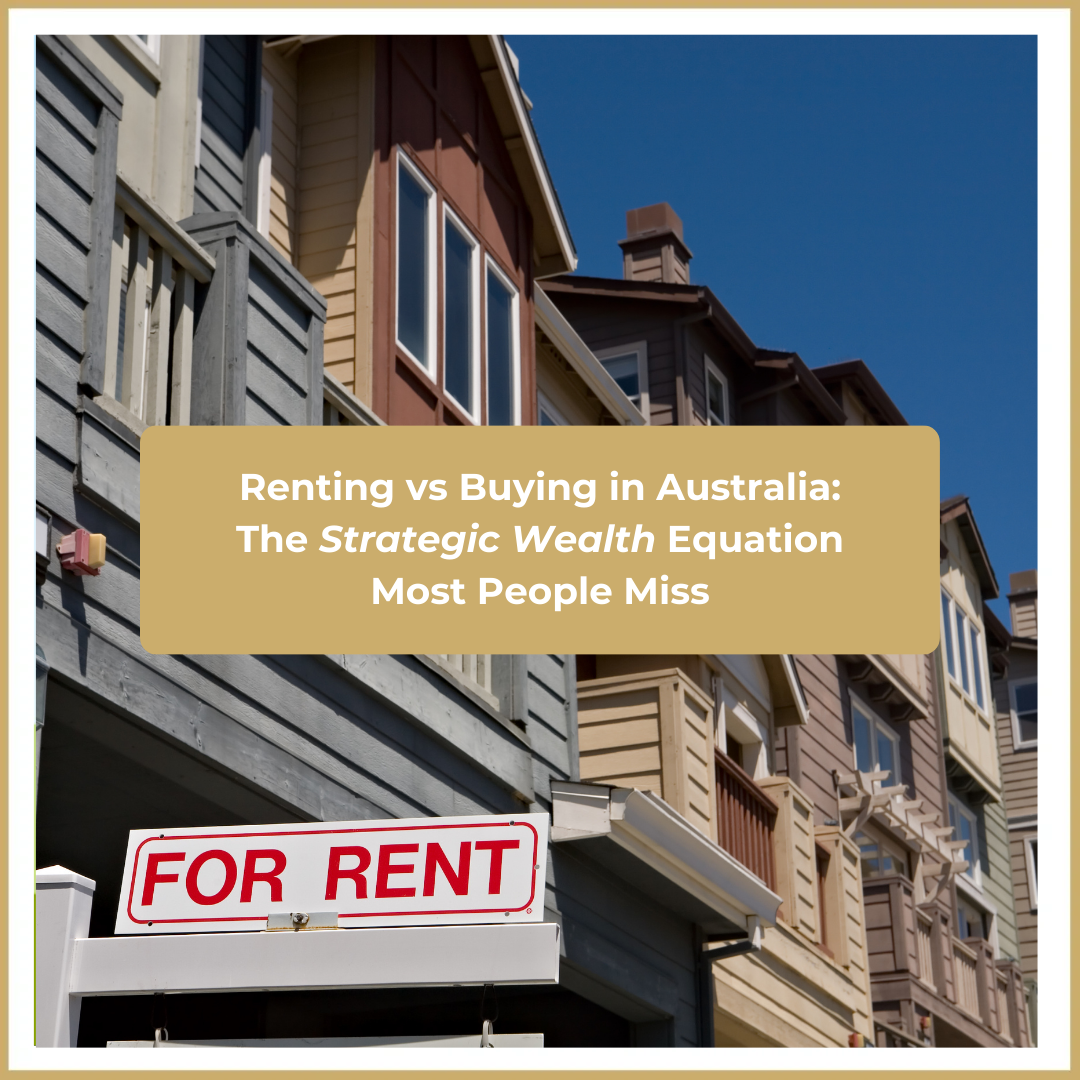After nearly two decades of investing and helping ambitious professionals and business owners build meaningful wealth, I’ve learned that some of the most expensive financial decisions are the ones people rush into with renting vs buying.
Few choices are as financially defining — or emotionally loaded — as the question:
Should I rent or buy?
To show how this decision really impacts your wealth over time, let me introduce you to Alex, a 35-year-old professional earning $150,000 with $100,000 in savings.
Alex is smart. Focused. Driven. Just like many of my clients.
But Alex is stuck on the big question — and most of the noise online is either too simplistic or too biased.
So we ran the numbers — with real-world assumptions, strategic insights, and behavioural context most financial tools miss.
Meet Alex’s Starting Point
- Age: 35
- Income: $150,000 p.a.
- Savings: $100,000
- Rent: $700/week
- Investment return: 10% p.a. pre-tax (7% after 30% marginal tax)
- Home Purchase Price: $700,000
- Mortgage: $643,000 (with LMI capitalised), 30 years, 6% interest
- Depreciation (investment property): 1.25% of property value per year
- Commute (if applicable): 6 hours/week @ $75/hour
- Timeframe: 10 years
The 6 Scenarios We Explored
Alex considered six viable paths:
- Rent and invest the difference
- Buy a home to live in (1% property growth, no commute)
- Buy a home to live in (1% property growth, 6-hour weekly commute)
- Buy a home to live in (3% growth, same commute)
- Buy an investment property, interest-only, 1% growth + invest the difference
- Same as above, but with 3% property growth
Each one has different cash flow dynamics, equity outcomes, tax impacts, and lifestyle implications. Here’s how they stacked up after 10 years.
The Wealth Results After 10 Years
Wealth Before Rent
The total financial position assuming all other components of wealth (equity, investment returns, tax benefits) are realised, before subtracting the cost of rent.
This helps isolate how well the strategy performs on its own, without being dragged down by rent. It’s particularly useful for comparing investment strategies where the person is still renting (e.g. rentvesting or interest-only investment properties).
Nominal Wealth (No Travel Cost)
The overall wealth outcome after 10 years, including rent and/or ownership, but excluding the value of lost time from commuting.
This reflects the typical financial outcome that most traditional calculators or spreadsheets would show — purely based on asset growth, debt reduction, investment returns, and rent — but ignoring lifestyle or time costs.
Net Wealth (True Wealth)
The most comprehensive view of financial position, accounting for:
- Property equity
- Investment performance
- Tax benefits
- Minus rent paid (if renting)
- Minus the opportunity cost of time (e.g. value of time spent commuting)
This represents “lived” wealth — the real impact on your financial life after factoring in both money and time. It’s what a high-performing financial strategy looks like when you overlay real human behaviour, lifestyle, and opportunity cost.
| Scenario | Wealth Before Rent | Nominal Wealth after Rent | Net Wealth (True Wealth, after commute) |
| Renting + Invest in a Property (7% return, No Commute) | $147,836 | -$216,164 | -$216,164 |
| Own to Live In (1% Growth, No Commute) | $235,136 | $235,136 | $235,136 |
| Own to Live In (1% Growth, Long Commute) | $235,136 | $235,136 | $1,136 |
| Own to Live In (3% Growth, Long Commute) | $402,642 | $402,642 | $168,642 |
| Renting + Invest in a Property (1% Growth, IO + Depreciation) | $270,043 | -$93,957 | -$93,957 |
| Renting + Invest in a Property (3% Growth, IO + Depreciation) | $437,549 | $73,549 | $73,549 |
So, What’s the Takeaway?

1. Owning Usually Wins — If You Live in It Wisely
Even if property only grows at 1% per year, Alex builds nearly $235K in net wealth just by living in the home and paying down the loan.
That’s the power of:
- Leverage: controlling a $700K asset with a smaller deposit
- Forced savings: every mortgage repayment builds equity
- Capital gains exemption: your home’s value grows tax-free in Australia
2. Renting + Investing Can Work — But Rarely Does
While it’s tempting to believe renting and investing gives you the best of both worlds, it falls apart if:
- You’re paying high rent (Alex paid $364K in 10 years)
- You don’t invest every dollar saved (most people don’t)
- Your portfolio doesn’t perform exceptionally
In this case, Alex ends up over $450K worse off than if they had bought a modest home and stayed disciplined.
3. Interest-Only Investment Strategies Need Tailwinds
If Alex buys an investment property and keeps renting, they only come out ahead if:
- Property grows at 3% or more
- They invest surplus cash diligently
- They claim depreciation and structure things tax-efficiently
Even then, the strategy only nets ~$74K — far below the benefit of owning to live.
Time: The Wealth Killer Hiding in Plain Sight

Now here’s where most financial calculators fail:
What is the cost of your time?
If Alex buys a home further from work to save on the purchase price — but commutes 6 hours a week — over 10 years, they lose:
- $234,000 worth of productivity, based on their $75/hour rate
That’s almost equivalent to the equity built in a low-growth property.
“You can compound money — but you can’t compound lost time.”
And yet, time is the easiest thing to underestimate in wealth planning. It’s invisible, emotional, and not easily tax-deductible. But that doesn’t make it less valuable.
That’s why I encourage clients to use time as a wealth benchmark — particularly when emotions run high.
Ask:
- What will this cost me in hours per week?
- What could I do with that time instead?
- Would I make the same decision if time — not money — was my most limited resource?
But Here’s the Real Secret: It Depends on You
This analysis is comprehensive — but not universal.
The right answer depends on:
- Your marginal tax rate (higher income = better tax benefits)
- Your discipline with surplus investing
- Your lifestyle values
- Your intentional use of time
If you save 6 hours a week on commuting but scroll Instagram or stress-binge on property blogs, that “saved time” adds no value. But if you use it to upskill, grow a business, or connect with loved ones — its financial worth can far exceed any mortgage.
Strategy Without Self-Awareness Is Just Math
The truth?
You can’t spreadsheet your way to wealth without factoring in human behaviour, energy, and priorities.
Some of my most financially successful clients never bought real estate — they mastered focus, flow, and leveraged their time to scale income.
Others became homeowners and used stability as a foundation to grow family and finances.
A few did both.
That’s why at CFV Advisory, we don’t just optimise portfolios. We optimise life decisions.
Because at the end of the day, it’s not about renting or buying.
It’s about:
- What you value
- How you use your time
- Where your money goes when no one’s watching
Want the Alex-Level Strategy for Yourself?
Book a Wealth Clarity Session with me.
We’ll walk through your numbers, your values, and your goals — then create a personalised plan that works for your life, not someone else’s spreadsheet.
Any discussion in this article does not take into account your objectives, financial situation or needs. Before acting on it, you should consider whether it’s appropriate to you, in light of your objectives, financial situation or needs.

